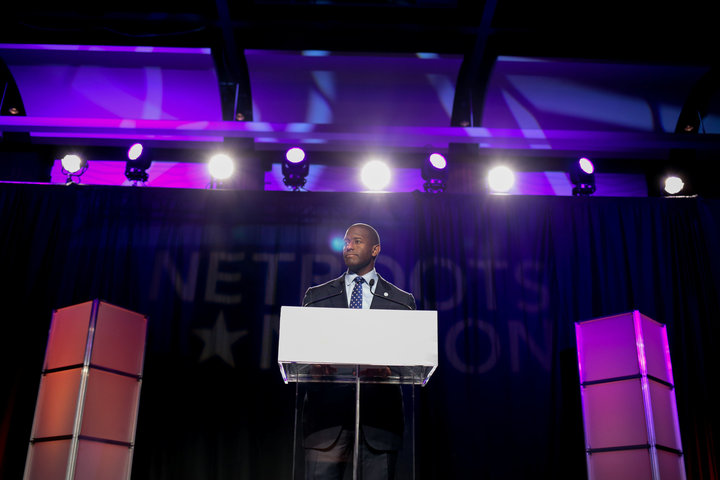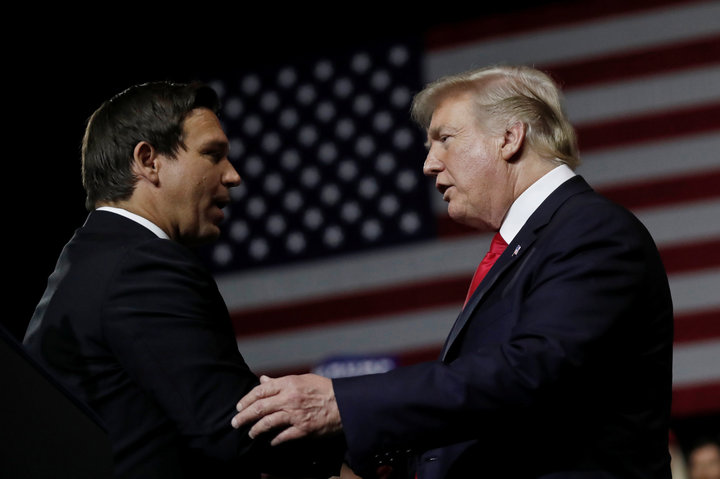[ad_1]
Andrew Gillum has become the first African-American nominee for Florida governor, pulling off an upset win over favorite Gwen Graham and two big-spending businessmen in a crowded Democratic primary field.
The Tallahassee mayor will face Jacksonville congressman Ron DeSantis, who easily defeated state agriculture commissioner Adam Putnam thanks to the backing of President Donald Trump.
“We’re going to bring this thing home,” Gillum told his election night gathering in Tallahassee. “As the mayor of Florida’s capital city, I humbly accept the Democratic nomination.”
Gillum never led in any public polling, but was showing signs of gaining momentum in the final weeks. He benefited from being chosen by the progressive wing of the party’s most generous benefactors ― including billionaires Tom Steyer and George Soros ― as well as from a barrage of negative ads against Graham by billionaire Jeff Greene.
Greene wound up finishing fourth in the five-way pack, but he spent $10 million on ads attacking Graham ― more than she spent on television on her own behalf. Liberal outside groups, meanwhile, coalesced around Gillum and served as his turnout operation, particularly in urban areas with large concentrations of younger and minority voters.
Gillum, 39, had difficulty raising money for his campaign after the revelation that the FBI was investigating Tallahassee city government. He says he heard he is not a target of the probe, but one of his closest friends and a former political ally has been the subject of federal subpoenas examining a restaurant he developed in part using city money.
Gillum wound up raising the least money of the five candidates ― $8.4 million between his campaign and a political committee under his control. In contrast, Greene raised $43 million, $40 million from himself. And Miami Beach Mayor Phil Levine, who started airing TV ads 10 months ago and led the race for several months, raised a total of $41 million, of which $29.5 million was his own cash.
But throughout the race, Gillum’s embrace of progressive ideals such as Medicare for all and his engaging public speaking style made him a favorite of the party’s most liberal activists. In the final weeks, he was endorsed by Vermont senator and 2016 Democratic presidential candidate Bernie Sanders, who campaigned with Gillum in the closing days of the race.
Gillum cut his teeth on political activism as a student government leader at Florida A&M University just a few blocks from Florida’s Capitol, where he led protests against Gov. Jeb Bush’s plan to revamp the state’s affirmative action programs. He went to work for People for the American Way before running for a seat on the Tallahassee City Commission in 2003. He became the city’s mayor in 2014.

Christopher Aluka Berry/Reuters
The Florida gubernatorial race will now become a referendum on Trump’s presidency, with Gillum painting DeSantis as a Trump clone and DeSantis hoping to bring out as many Trump voters as he can in November.
Trump has spent winter weekends and holidays at his Mar-a-Lago resort in Palm Beach for years and considers himself a part-time resident of the state. It is unclear how frequently, if at all, he will campaign for DeSantis in the two months leading up to the Nov. 6 general election. Whether Republicans retain control of Congress could determine the survival of the Trump presidency, and his political advisers may choose to focus his time on House and Senate seats.
Trump campaigned with DeSantis only once during the primary, at a rally in Tampa in July, and sent out a handful of supportive statements on Twitter, including the message “VOTE FOR RON” in all capitals late Monday. But in a GOP primary electorate bearing little resemblance to the one that supported former Gov. Jeb Bush and former U.S. Sen. Connie Mack, Trump’s seal of approval allowed DeSantis to overcome enormous disadvantages in cash and traditional support.
The state Republican establishment was solidly behind Putnam even before he announced his candidacy. From a cattle ranching and citrus family in the heart of the state, Putnam had been grooming himself for this run from the time he graduated college. He won a state legislative seat at age 22, then moved to Congress four years later, returning to Florida in 2010 to run for state agriculture commissioner.
He served two terms, coinciding with Rick Scott’s years as governor, and had appeared the heir apparent to the job as Scott leaves because of term limits.
DeSantis, in contrast, entered politics just six years ago, when he ran for Congress from the wealthy suburbs of Jacksonville, his hometown, after serving as a Navy prosecutor. His deployment to Iraq during President George W. Bush’s “troop surge” there was a highlight of his biography on the campaign trail. Despite the populist, pro-Trump rhetoric he has delivered for years from the Fox TV studio near the U.S. Capitol, DeSantis graduated from Yale and received a law degree from Harvard.

Carlos Barria/Reuters
And while Putnam also praised Trump repeatedly on the campaign trail, his standing with Trump likely was irreparably damaged in October 2016 after the release of the “Access Hollywood” tape that featured Trump bragging that his celebrity enabled him to grab women by the genitals. Putnam criticized Trump for the remarks, while DeSantis did not.
DeSantis leaned on Trump’s approval heavily, mentioning it often in stump speeches and in TV ads. He even produced an ad using his young children as props, dressing up his infant in a “Make America Great Again” onesie.
Yet while DeSantis’ love for and from Trump clearly helped him against Putnam in the Republican primary, it may wind up hurting him in the November election against Gillum. Trump is not popular with many independents and even some moderate Republicans. Democrat Margaret Good defeated the son of sitting Republican congressman Vern Buchanan in a special election for a state House seat in Sarasota earlier this year, even though the district leans solidly Republican.
Florida Democrats have not won a governor’s race since 1994, when Lawton Chiles won a second term by defeating Republican Jeb Bush. The party has come within a single percentage point in both 2010 and 2014, losing both times to Scott.
This story has been updated with a statement from Andrew Gillum and additional information about him.
[ad_2]
Source link

